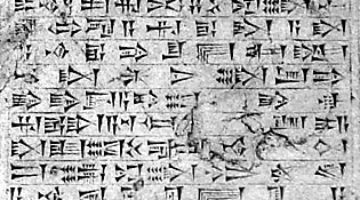This is my attempt at a full “simple” syllabary (i.e., V, CV & VC only) for Akkadian, based on what I can find online and in books.
This is a student’s work, so, even though I try my best to ensure the information is correct, you shouldn’t take this as a reliable or authoritative source.
| Xa | Xe | Xi | Xu | ||
| – | a 𒀀, á 𒀉 |
e 𒂊, é 𒂍 |
i 𒄿, í=IÁ 𒐊 |
u 𒌋, ú 𒌑, ù 𒅇 |
|
| k- | ka 𒅗, ká 𒆍, kà=GA 𒂵 |
ke, ki=KI 𒆠, ké, kí=GI 𒄀 |
ku 𒆪, kú=GU7 𒅥, kù 𒆬, ku4 𒆭 |
||
| g- | ga 𒂵, gá 𒂷 |
ge, gi=GI 𒄀, gé, gí=KID 𒆤, gè, gì=DIŠ 𒁹 , gi4 𒄄, gi5=KI 𒆠 |
gu 𒄖, gú 𒄘, gù=KA 𒅗, gu4 𒄞, gu5=KU 𒆪, gu6=NAG 𒅘, gu7 𒅥 |
||
| q- | qa=SÌLA 𒋡 | qe,qi=KIN 𒆥 | qu=KUM 𒄣 | ||
| p- | pa 𒉺, pá=BA 𒐀 |
pe=PI 𒉿, pé=BI 𒁉 |
pi 𒉿, pí=BI 𒁉, pì=BAD 𒁁 |
pu=BU 𒁍, pú=TÚL 𒇥, pù 𒅤 |
|
| b- | ba 𒁀, bá=PA 𒉺, bà=EŠ 𒂠 |
be=BAD 𒁁, bé=BI 𒁉, bè=NI 𒉌 |
bi 𒁉, bí=NE 𒉈, bì=PI 𒉿 |
bu 𒁍, bú=KASKAL 𒆜, bù=PÙ 𒅤 |
|
| t- | ta 𒋫, tá=DA 𒁕 |
te 𒋼, té=TÍ 𒊹 |
ti 𒋾, tí 𒊹, tì=DIM 𒁴, ti4=DI 𒁲 |
tu 𒌅, tú=UD 𒌓, tù=DU 𒁺 |
|
| d- | da 𒁕, dá=TA 𒋫 |
de=DI 𒁲, dé , dè=NE 𒉈 |
di 𒁲, dí=TÍ 𒄭 |
du 𒁺, dú=TU 𒌅, dù=GAG 𒆕, du4=TUM 𒌈 |
|
| m- | ma 𒈠, má 𒈣 |
me 𒈨, mé=MI 𒈪, mè 𒀞/𒅠 |
mi 𒈪, mí=MUNUS 𒊩, mì=ME 𒈨 |
mu 𒈬, mú=SAR 𒊬 |
|
| n- | na 𒈾, ná 𒈿, nà=AG 𒀝, na4 (“NI.UD”) 𒉌𒌓 |
ne 𒉈, né=NI 𒉌 |
ni 𒉌, ní=IM 𒉎 |
nu 𒉡, nú=NÁ 𒈿 |
|
| s- | sa 𒊓, sá=DI 𒁲, sà=ZA 𒍝, sa4 (“ḪU.NÁ”) 𒄷𒈾 |
se, si=SI 𒋛, sé, sí=ZI 𒍣 |
su 𒋢, sú=ZU 𒍪, sù=SUD 𒋤, su4 𒋜 |
||
| z- | za 𒍝, zá=NA4 𒉌𒌓 |
ze=ZI 𒍣, zé=ZÌ 𒍢 |
zi 𒍣, zí 𒍢, zì 𒍥 |
zu 𒍪, zú=KA 𒅗 |
|
| ṣ- | ṣa=SAG 𒊕 | ṣe, ṣi=ZÍ 𒍢 | ṣu=UZ 𒊺𒄷 | ||
| š- | ša 𒊭, šá=NÍG 𒐼, šà 𒊮 |
še 𒊺, šé, šè 𒂠 |
ši=IGI 𒅆, ší=SI 𒋛 |
šu 𒋗, šú 𒋙, šù=ŠÈ 𒂠, šu4=U 𒌋 |
|
| h-, ḫ- | ḫa 𒄩, ḫá=ḪI.A 𒄭𒀀, ḫà=U 𒌋, ḫa4=ḪI 𒄭 |
ḫe, ḫi=ḪI 𒄭, ḫé, ḫí=GAN 𒃶 |
ḫu 𒄷 | ||
| l- | la 𒆷, lá=LAL 𒇲, là=NU 𒉡 |
le, li=LI 𒇷, lé, lí=NI 𒉌 |
lu 𒇻, lú 𒇽 |
||
| r- | ra 𒊏, rá=DU 𒁺 |
re, ri=RI 𒊑, ré, rí=URU 𒌷 |
ru 𒊒, rú=GAG 𒆕, rù=AŠ 𒀸 |
||
| y- | ya=IA 𒅀 | ||||
| ‘- | ‘a=A’ 𒀪 | ||||
| w- | wa, we, wi, wu=PI 𒉿 | ||||
| Xa | Xe | Xi | Xu | ||
| aX | eX | iX | uX | ||
| ag 𒀝, ág 𒉘 |
eg, ig=IG 𒅅, ég, íg=E 𒂊 |
ug 𒊌 | -k, -g, -q | ||
| ab 𒀊, áb 𒀖 |
eb, ib=IB 𒅁, éb, íb=TUM 𒌈 |
ub 𒌒, úb=ŠÈ 𒂠 |
-p, -b | ||
| ad 𒀜, ád 𒄉 |
ed=Á 𒀉 | id=Á 𒀉, íd=A.ENGUR 𒀀𒇉 | ud 𒌓, úd=ÁŠ 𒀾 | -t, -d | |
| am 𒄠/𒂔, ám=ÁG 𒉘 |
em=IM 𒅎 | im 𒅎, ím=KAŠ4 𒁽 |
um 𒌝, úm=UD 𒌓 |
-m | |
| an 𒀭 | en 𒂗, én, èn=LI 𒇷 |
in 𒅔, in4=EN 𒂗, in5=NIN 𒊩𒌆 |
un 𒌦, ún=U 𒌋 |
-n | |
| as=AZ 𒊍 | es, is=GIŠ 𒄑, és, ís=EŠ 𒂠 , éz, íz=IŠ 𒅖 |
uz=ŠE&HU 𒊺𒄷 úz=UŠ 𒍑, ùz 𒍚 |
-s, -z, -ṣ | ||
| aš 𒀸, áš 𒀾 |
eš 𒌍/𒐁, éš=ŠÈ 𒂠 |
iš 𒅖, íš=KASKAL 𒆜 |
uš 𒍑, úš=BAD 𒁁 |
-š | |
| aḫ 𒄴, áḫ=ŠEŠ 𒋀 |
eḫ, iḫ=AḪ 𒄴 | uḫ=AḪ 𒄴, úḫ 𒌔 |
-h, -ḫ | ||
| al 𒀠, ál=ALAM 𒀩 |
el 𒂖, él=IL 𒅋 |
il 𒅋, íl 𒅍 |
ul 𒌌, úl=NU 𒉡 |
-l | |
| ar 𒅈, ár=UB 𒌒 |
er=IR 𒅕 | ir 𒅕, íp=A.IGI 𒀀𒅆 |
ur 𒌨, úr 𒌫 |
-r | |
| aX | eX | iX | uX | ||

